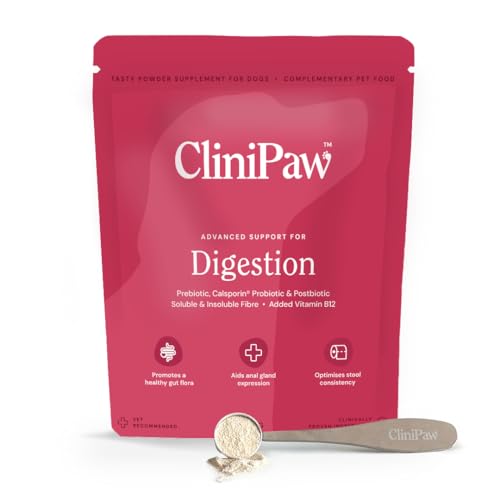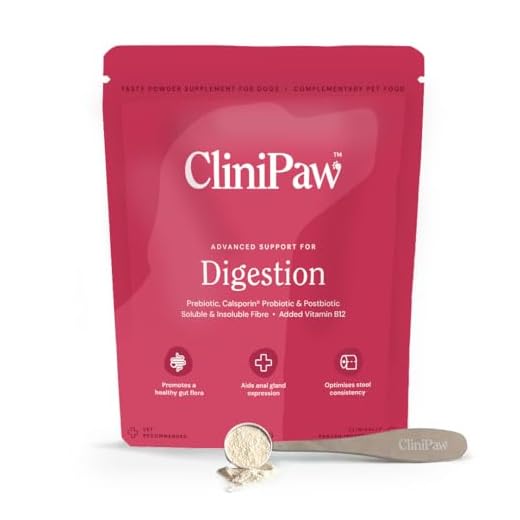




A high-quality diet with easily digestible proteins is pivotal for canines facing intestinal protein loss. Consider incorporating hydrolysed protein sources, such as those derived from chicken or fish, which can alleviate the burden on the digestive system while providing essential nutrients. Gradually transitioning to this diet can help in minimising gastrointestinal disturbances.
Regular veterinary check-ups are crucial. Monitoring blood protein levels and overall health can guide necessary adjustments in dietary plans. Collaborating with a veterinarian to tailor a specific nutritional strategy ensures that your pet receives adequate amino acids and maintains a healthy weight.
Probiotics play a significant role in supporting gut health. Introducing a high-quality probiotic supplement can help restore the balance of beneficial bacteria in the intestines, aiding in nutrient absorption and reducing inflammation. Always consult a vet before adding any supplements to your dog’s regimen.
In some cases, medications may be required to manage inflammation or underlying conditions. Anti-inflammatory drugs, along with treatments for any diagnosed infections, can significantly improve your canine’s condition. Regular communication with the veterinary team allows for timely adjustments to the treatment plan.
Lastly, providing a stress-free environment can enhance recovery. Stress can exacerbate gastrointestinal issues, so creating a calm space for your furry friend can aid in their healing process. Simple changes, like a quiet area for meals and regular exercise, can contribute to their overall well-being.
Management Strategies for Canine Protein-Losing Disorders
Start with a veterinary consultation to pinpoint the underlying cause of the condition. This ensures a tailored approach to care. A combination of dietary modifications and medications often yields the best results.
Focus on nutrition. A high-quality, easily digestible diet is paramount. Look for options that are low in fat and high in protein. Consider hypoallergenic or prescription diets if allergies are suspected. Brands like who makes collards dog food can provide suitable formulations.
- Introduce small, frequent meals throughout the day to enhance nutrient absorption.
- Incorporate supplements, such as omega-3 fatty acids, to help reduce inflammation.
- Monitor hydration closely, ensuring fresh water is always available.
Medications may include anti-inflammatory drugs or immunosuppressants, depending on the diagnosis. Always follow your vet’s guidance regarding dosages and potential side effects.
Regular follow-ups are essential. Schedule routine check-ups to monitor weight and overall health. Adjust the treatment plan as necessary based on your pet’s progress.
Be observant of any changes in your pet’s behaviour or appetite. Document these changes and discuss them with your veterinarian during visits.
Identifying Symptoms of Protein-Losing Enteropathy
Pay close attention to weight loss despite a good appetite. This is one of the first signs I noticed in my own pet. It’s perplexing to see a dog eagerly eating yet losing weight steadily. Look for changes in the coat as well; a dull, thinning coat can indicate underlying issues. If your furry friend develops any swelling in the abdomen or has an unusual build-up of fluid, this should raise immediate concern.
Gastrointestinal Distress
Monitor for vomiting or diarrhoea, especially if these symptoms persist. In my experience, the frequency and consistency of the stool can tell you a lot; watery stools with a foul odour can be particularly telling. Additionally, notice if your pet seems more lethargic than usual or shows signs of discomfort when moving. These behavioural changes can often be overlooked but are significant indicators of health problems.
Behavioural Changes
Keep an eye on your dog’s energy levels. If your companion is less enthusiastic about playtime or walks, it might be worth investigating further. Unusual food cravings or a sudden shift in diet preferences can also signal distress. When I observed my dog becoming picky with meals, it prompted a trip to the vet, which proved to be a wise decision. Early identification of these symptoms can make a significant difference in the outcome.
Diagnostic Procedures for Accurate Diagnosis
Performing a thorough diagnostic workup is crucial for pinpointing the underlying issues causing the loss of vital proteins in the gastrointestinal tract. Start with a comprehensive physical examination, paying close attention to weight, hydration status, and abdominal palpation. This can reveal clues about potential abnormalities.
Blood tests are indispensable. A complete blood count (CBC) and serum biochemistry panel provide insights into the dog’s overall health and help identify any concurrent diseases. Look for low albumin levels, as this can indicate protein loss.
Next, a faecal examination is necessary. This should include tests for parasites, as certain infestations can contribute to protein loss. Additionally, consider performing a faecal alpha-1 protease inhibitor test, which can help assess the degree of gastrointestinal protein leakage.
Advanced imaging techniques like ultrasound or radiography allow visualisation of the gut’s structure. These methods can help identify masses, thickened bowel walls, or other lesions that might disrupt normal function.
If initial diagnostics are inconclusive, an endoscopy can be performed. This procedure enables direct visualisation of the gastrointestinal lining and allows for the collection of biopsies. Histopathological analysis of these samples is pivotal in diagnosing conditions such as inflammatory bowel disease or neoplasia.
Lastly, consider monitoring the dog’s response to dietary changes. A hypoallergenic diet may help identify food allergies that could be contributing to the issue. Keeping a detailed record of symptoms and dietary intake is beneficial in tracking progress and refining the approach.
Dietary Management Strategies for Affected Canines
Feeding a canine with this condition requires careful selection of ingredients. Opt for a high-quality, easily digestible protein source such as chicken, turkey, or fish. These proteins should be low in fat to minimise gastrointestinal stress.
Incorporate carbohydrates like rice or sweet potatoes, which provide energy without irritating the gut lining. Avoid grains that can be harder to digest, such as wheat or corn, as they may exacerbate issues.
Introduce soluble fibre to the diet, found in ingredients like pumpkin or psyllium husk. This can help with nutrient absorption and regulate bowel movements, contributing to overall gut health.
Consider a hypoallergenic diet if food sensitivities are suspected. Limited ingredient diets can help identify troublesome components. Always consult a veterinarian before making significant changes to your pet’s nutrition.
Frequent, smaller meals spread throughout the day reduce the burden on the digestive system. This strategy can help maintain energy levels while ensuring that your furry friend gets the necessary nutrients without overwhelming their gut.
Hydration is crucial. Ensure fresh water is always available, as it aids digestion and nutrient transport. Adding electrolytes, under veterinary guidance, can help maintain fluid balance, especially if there are signs of dehydration.
Lastly, keep a close eye on weight and body condition. Regular check-ins with your veterinarian can help adjust dietary plans as needed, ensuring that your companion remains healthy and comfortable.
Medication and Supplement Options for Treatment
Consider corticosteroids such as prednisone to reduce inflammation within the gastrointestinal tract. This can help improve protein absorption and decrease fluid loss. Dosage will depend on the severity of the condition, so close veterinary supervision is essential.
For managing chronic conditions, immunosuppressants like cyclosporine or azathioprine may be beneficial. These medications can help control immune-mediated reactions that often contribute to gastrointestinal issues. Regular blood work is necessary to monitor liver function and overall health during treatment.
Proton pump inhibitors, including omeprazole, can reduce gastric acid production, aiding in gastrointestinal healing. This can be particularly useful if there are concurrent issues like gastritis or ulcers exacerbating the situation.
Antibiotics such as metronidazole may be prescribed if there is a suspicion of bacterial overgrowth or dysbiosis. The goal is to restore a healthy balance in the gut microbiome, which can assist with protein absorption.
Adding supplements like probiotics can enhance gut health. These live microorganisms can help restore the natural balance of bacteria in the gastrointestinal tract, potentially improving nutrient absorption and decreasing symptoms.
Consider omega-3 fatty acids, which can have anti-inflammatory effects. Fish oil supplements can support gut health and overall immune function. Dosage should be tailored to the size and health status of your pet.
Lastly, a high-quality protein supplement might be necessary to ensure adequate protein intake without overloading the digestive system. Look for easily digestible sources that align with your pet’s dietary requirements.







